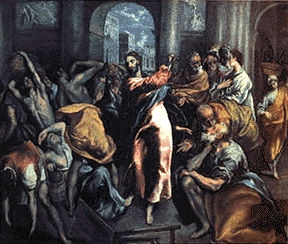
AnthonyFlood.com
Philosophy against Misosophy

Jesus Is an Anarchist
James Redford
12. Cleansing of the Temple: Righteous Libertarian Vigilantism
The only recorded act of violence by Jesus was what is now known as "the cleansing of the temple":
Matthew 21:12,13: Then Jesus went into the temple of God and drove out all those who bought and sold in the temple, and overturned the tables of the money changers and the seats of those who sold doves. And He said to them, "It is written, 'My house shall be called a house of prayer,' but you have made it a 'den of thieves.' " (See also Mark 11:15-17; Luke 19:45,46; John 2:14-17.)
Now this event is often misinterpreted as being some sort of revolt by Jesus on the bad aesthetics of commerce being conducted inside of God's temple, and so is given as anti-libertarian and free-market commentary. But if that were really what this episode was about then there would have been no cause for Jesus to accuse the priests of turning the temple into a "den of thieves."
Jesus was being literal when he said that. To understand what Jesus was talking about one has to understand the nature of what was being bought and sold in the temple as well as the function of the "money changers."
What was being bought and sold in the temple were animals which were to be sacrificed as a sin offering, and the function of the money changers was to convert the Gentile Roman money into the Jewish money which would then be suitable to present inside the temple for purchase of the sacrificial animals.
The people who bought these animals did not get to take them home to eat – if they had then Jesus would have had no good reason to object the commerce being conducted at the temple, and certainly would have no grounds to accuse the priests of thievery. Rather, the animals stayed in the temple to be sacrificed by the Levitical priests, which by so doing would (as it was supposed) atone for the sins of the purchaser of the sacrificed animal.
So when Jesus accused the priests who conducted this practice of being thieves what he was saying was that the people who bought these animals to be sacrificed to atone for their sins were being ripped-off – i.e., that the animal sacrifices weren't doing anything for their sins. In other words, the priests were selling religious snake-oil – misrepresenting their product as curing something it couldn't cure; hence they were committing fraud (per libertarian rights theory).
Now realize what is at stake here: Jesus came to save people's very souls, and here people are being deceived and defrauded into believing that sacrificing these animals is setting their souls right with God. As it is written in Hebrews 10:4-7:
For it is not possible that the blood of bulls and goats could take away sins. Therefore, when He came into the world, He said: "Sacrifice and offering You did not desire, But a body You have prepared for Me. In burnt offerings and sacrifices for sin You had no pleasure.
Then I said, 'Behold, I have come – In the volume of the book it is written of Me – To do Your will, O God.' " Previously saying, "Sacrifice and offering, burnt offerings, and offerings for sin You did not desire, nor had pleasure in them" (which are offered according to the law) [...]
If we assume that Jesus is God's Messiah then He was in a particularly unique position to accurately determine whether or not these animal sacrifices were achieving what was being claimed for them, and having determined that the priests were defrauding their patrons, He took appropriate libertarian action (per Rothbardian theory in particular) by using retaliatory force against these thieves.
It is important to point out that it is only a true Messiah from God which could have rightly taken such action, for any normal man would not have possessed the requisite information in order to make that determination honestly.
Thus, not only was Jesus's only use of force quite libertarian, but it was also in a situation which would have been inappropriate for most anyone else.
Next
13. Jesus on the War on Drugs (and all Forms of Prohibition)